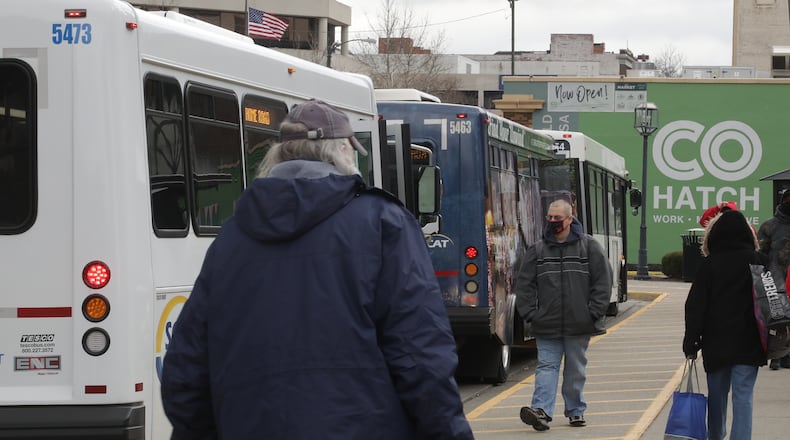The study kicked off last fall and focused on the transportation needs of older adults, people with disabilities, those with lower incomes and workers in the next 10 to 15 years.
Representatives from the transportation committee and TranSystems presented their findings to the Clark County commission on Wednesday morning, recommending that the city and county consider a transition to demand response – also called “dial-a-ride” services. Under this system, passengers would schedule their trips in advance and receive a ride from their origin to their destination, possibly with a bus transfer in downtown Springfield. Buses would not be utilized; rather, transportation services would use vans.
For city transit, the study recommended the city transition into using “service zones” that don’t require transfers unless a passenger’s destination leaves the zone in which they started their commute. These service zones can be split in three proposed ways:
- One service zone: There would be no requirement for a transfer downtown to reach more distant destinations.
- Two service zones: The dividing line would be Limestone Street, slicing the city into east and west zones.
- Four service zones: The dividing lines would be Limestone and Main Streets, creating northwest, northeast, southwest and southeast zones.
Public transportation outside of Springfield is non-existent for many Clark County residents. The study recommends that the count also be split into two service zones: east and west. This would require transfers in downtown Springfield for cross county trips, and transfers could also be made to out-of-county transit systems.
The transition to additional urban transportation services and the creation of new rural services are costly. More than $265,000 is the estimated total of operating and capital costs for the urban services expansion, and the estimate for the new rural service is $1.18 million, the study found. However, federal and state subsidies are expected to contribute to the bulk of costs, with $93,328 expected for a local match for city services and $170,296 expected for the local contribution to rural county transit.
Local matches can be reduced, too, from employer subsidies and service contracts with social service providers, according to the transportation committee.
Transportation planner Glen Massie said Wednesday that several employers that want to contribute to city and county transportation services.
Fares to use public transportation may also change in the county’s future. Those using demand response services in the rural spaces may be charged based on miles traveled per the recommendation of the study. Transfers would be free within zones.
Urban fares could increase by 25 cents or more, per the study’s recommendations.
County commissioners did not act on the study findings at their Wednesday meeting, but voiced a lack of public transportation options outside of Springfield.
“We know there’s an established need,” said Commissioner Melanie Flax Wilt.
Currently, public transit is available in Springfield through the Springfield City Area Transit (SCAT), which has several fixed routes that operate every hour, with one route operating every 30 minutes. Buses first pick up passengers as early as 6:40 a.m. for some routes, and buses cease picking up passengers before 7 p.m.
The city also operates a paratransit for ADA-certified passengers who cannot use SCAT and who call ahead at least 24 hours before their desired trip, and all people can use SCAT’s dial-a-ride service to schedule a ride, according to the transportation committee.
Throughout the study, the transportation committee met with health care leaders, education leaders, local employers, and other stakeholders to hear about their transportation needs.
The study found that employers in the area are struggling to attract employees, with lack of frequent transportation being an obstacle. The study also found that the current fixed routes in the city did not meet the scheduling needs of industrial employers in the county, which have shifts that begin and end after buses stop running.
Medical providers and social service agencies would also benefit from flexible services to help patients access transportation after hospital stays or doctor’s appointments, the study found.
The Clark County Commission authorized a $123,388 contract with TranSystems for the county transit study in September 2021. The last county transit study operated in Clark County was completed in 2009.
The study’s findings were also presented to Springfield city commission on Tuesday evening.
About the Author

